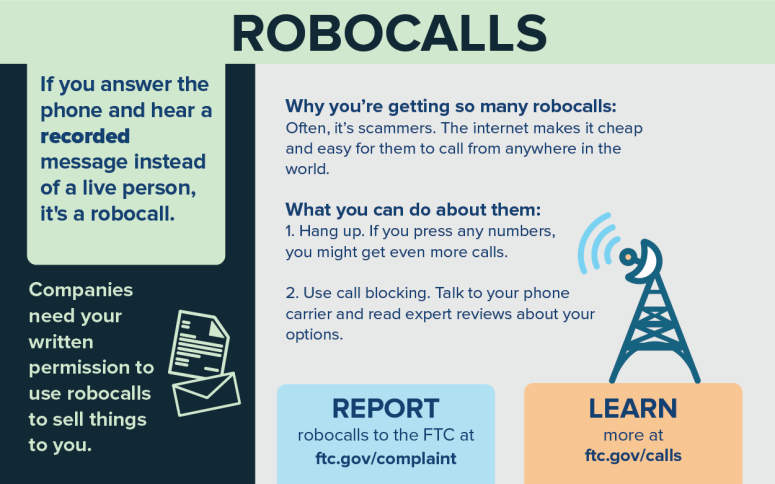The Federal Trade Commission (FTC) on Tuesday announced a big, fat crackdown in which it’s targeting operators responsible for one billion illegal robocalls. Or, using verbiage more appropriate to our current robocall nightmare, “a drop in the bucket.”
After all, according to the spam-call blocker company YouMail, there were an estimated 4.7 billion robocalls placed in the month of May alone. Still, any dent in that number is welcome.
The commission said that its joint crackdown – the Department of Justice (DOJ) is chipping in – is called “Operation Call It Quits.”
The crackdown involves 94 actions targeting operations around the country that are behind the never-ending e-blabber of robots offering services from scammers, including credit card interest rate reduction, get-rich pitches, and medical alert systems… or what the FTC calls the “tide of universally loathed pre-recorded telemarketing calls.”
The operation includes four new cases and three new settlements from the FTC alone, it said. The DOJ filed two of the new cases on the FTC’s behalf. In all, the defendants in these cases were responsible for making more than one billion illegal robocalls to consumers nationwide, the FTC said. These new cases bring the FTC’s count to a total of 145 cases against illegal robocallers and Do Not Call (DNC) violators.
The defendants
First Choice Horizon LLC is an example of the multiple robocalling rings being charged in this roundup. In that case, the FTC is charging six corporate and three individual defendants with illegally robocalling financially distressed consumers – often seniors – with bogus offers of credit card interest rate reduction services.
According to the complaint, the defendants allegedly told their targets that they could lower their credit card interest rates to zero for the life of the debt, thus saving themselves thousands of dollars on their credit card debt… for a fee, of course. Then, the alleged scammers would allegedly “confirm” their target’s identities, thus getting them to divulge personal financial information, including their taxpayer and credit card numbers.
The FTC alleges that the defendants neglected to mention the hefty, additional bank or transaction fees the consumers would be hit with… or that they’d allegedly go on to open up credit cards on behalf of their targets without their knowledge or say-so.
Another robocaller ring that’s facing charges from the FTC is an outfit called 8 Figure Dream Lifestyle that allegedly pitched fraudulent money-making schemes via robocalling. Other defendants are charged with spoofing caller ID information and using robocalls to drum up business leads. Besides the FTC’s efforts, 25 federal, state and local agencies have opened 87 cases against robocall offenders as part of Operation Call it Quits.
Meanwhile, in Congress…
While the FTC is doing its thing with hunting down robocallers, filing charges against them, and pushing for the development of technology-based solutions to block robocalls and combat caller ID spoofing, bipartisan legislation is still working its way through Congress.
In May 2019, the US Senate passed an anti-robocalling bill. It’s still waiting for the House to take it up, which the House might not do, given that it’s working on its own version, the Stopping Bad Robocalls Act (HR 946).
While we wait for something to happen in Washington, this is what we can all do to try to lessen our own, private robocaller nightmares:
What NOT to do?
Besides wrestling robocallers in the courtroom, Operation Call It Quits also has an educational component regarding how to stop unwanted calls. Though it might be old hat for many of us, it’s a must-read for anybody who still thinks that if they’re told to “press 1 to speak to an operator”, they should actually do that …in the hope, perhaps, of screaming some human ears off?
Here’s the advice, in a nutshell: Don’t press anything. Think of yourself as the person in the horror movie whom you always scream at to not go into that dark basement. Pressing any buttons (besides the one to hang up the call) is like rubbing “living human” pheromones onto yourself before you go into the dank robocaller basement.
The FTC says you should hang up without pressing any options, block the number, and then report it to the Commission. Andrew Smith, the Director of the Bureau of Consumer Protection at the FTC, said that pushing buttons is the most common mistake people receiving robocalls tend to make.
From remarks he made at a press conference:
Pressing numbers to speak to someone or remove yourself from the list will probably only lead to more robocalls.
Typically, the robocallers give you two options: Press one to speak with a customer service rep – or what’s better known as a scammer – or press two to be removed from their calling list.
In a word: Don’t! Punching any number just leads to more calls. Robcalling is a numbers game: they place a massive number of calls, most of which go to dead or inactive numbers. If you press a button, it lets the scammers know that they’ve not only hit a live number, but that they’ve hit on somebody willing to answer calls from unknown callers.
Be very, very quiet: just back out of that robocaller basement without the scammers getting a whiff of fresh meat, hang up, and block/report the number.


Keith
What a joke! The FTC says “you should hang up without pressing any options, block the number, and then report it to the Commission.” Assuming you have caller ID, Assuming the caller ID was not spoofed, Assuming you’ve paid for a call block service. When you report the call to the FTC you are supposed to list both the company and the phone number who called you. Even if you have the necessary added-cost phone services, all the displayed and spoken info is probably spoofed as well. In this day and age, the US FTC is nothing more than another arm of the spammers themselves along with being revenue enablers of the telecom and ISP industries.
thedrogsofwar
I just don’t ever answer the phone unless I know who’s calling. If it’s important enough, they’ll leave a voicemail and I’ll call them back.
Rhonda C
I have contacted the “Do Not Call Registry” so many times that I can’t count them. I continue to get these calls EVERY day, 4-5 at minimum. I haven’t heard anyone speak of this type of call, which I receive on my landline and cell phone: Of course it’s a recording telling me that the local sheriff’s department will be coming to arrest me if I don’t….it usually has something to do with back taxes or bills I haven’t paid, but I’ve never heard the entire message because I hang up. These calls are numerous and constant. I have reported to “Do Not Call”, and they did stop for awhile, that didn’t last long. Since these calls are recordings, how does it help to have one’s phone company block calls? A friend of my has a call blocker through her phone company, but it’s just a recording that states this # does not accept solicitation calls, and goes on and on. So if I call I have to listen to that entire message before I get through. I found out about one of their scams when I received a call that my caller ID showed as the phone number and name of one of my neighbors. It wasn’t my neighbor!!
Robocallers are getting smarter, and we’re getting nowhere fast!!
Chuck
The law makers can’t fix this issue. It needs to be handled with Technology at the phone companies. As soon as they can be incentified to add the technology, it will happen.
epic_null
At least SHAKEN and STIR are coming, so at minimum we can expect source authentication to improve and spoofing to become significantly harder.
Kurt S
Just block EVERYTHING that is not in your Contacts list. It makes for a quieter life.
Martin Gray
Yes I press one every time and I tell them that they have reached the police department. They hang up abruptly and delete my number,
Steve
Whatcha gonna do when the cops call you?
epic_null
Probably explain that it’s an anti robocall method then ask why they spoofed their numbers.